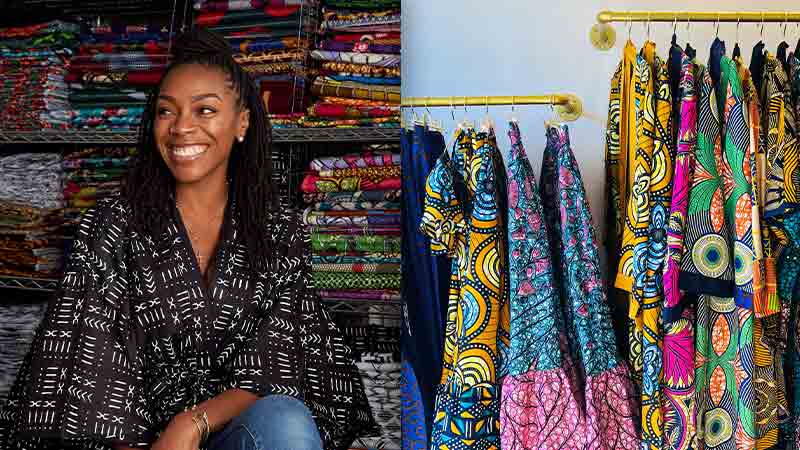Being a brand: Love Iguehi breaks the neutral mold with bold African prints
Founder Iguehi James on building loyalty, community and a cashless business

Growing up in West Oakland, CA with Nigerian parents, Iguehi James, the eldest of four, served as a bridge between two very different cultures — one made up of her American friends and the other influenced by her parents.
“My parents had no concept of prom,” James muses. “I had to introduce them to things that were just commonplace for American culture.”
Like most first-gen teens, Iguehi just wanted to fit in, but her family exposed her to a rich culture of color, food and music that would impact her life as an entrepreneur, wife and mother.
“When you go to parties, weddings or naming ceremonies, art is just so immersed in our culture. Color is what we do,” says James. Her dad is a visual artist, painting and sculpting, and her mom expresses her creativity through food. To buck the family trend, James earned a master’s in public health, working on telemedicine research for the UCSF Clinical Innovation Center.
Then, she made a huge pivot.
After friends and strangers noticed her talent for pairing colorful African Ankara prints with beautiful kaftan dresses, dusters, convertible wraps and accessories, Love Iguehi, an apparel company that blends her Oakland roots with her Nigerian heritage, was born in 2016.
In 2020, James participated in the first iteration of a program spearheaded by Visa’s Black Employee Resource Group (ViBE), in which Visa created a marketplace for black-owned businesses at its Foster City office. Today, she owns a cashless shop in downtown Oakland. Here, she shares her tips for building a brand that shines in an increasingly competitive crowd.
Connect with your community.
“I can market my brand as much as I want to market it, but it carries so much more weight when a customer, who has experienced it, shares the brand with their network,” says James. She has built a loyal following of customers, affectionately called the Love Tribe, who love her brand for its quality, uniqueness and her ability to break them out of the neutral mold. They earn perks, too, like discounts and previews. “Over time, the brand has created this sense of connectedness that I think we've all been yearning for,” says James.
Be more than a product.
Customers also embrace James’ ability to connect them socially through events like Paint and Sips, charcuterie-board-making classes and head-wrapping classes. “It's been an opportunity for me to partner with other small business owners and just be in a space where women feel celebrated, they feel seen, they feel loved. That's what I want the brand to exude.”
Promote yourself on and off screen.
While social media algorithms continue to make it challenging to reach customers organically, IRL events have proven successful to James’ business. “Conferences that target women, especially African-American women who are more likely to be interested in my clothes, have been great,” she says. “It’s a great way to advertise the brand and have people experience it on the spot.” With social media, there’s more pressure these days to post perfect photos and stand out. “I started building the brand by just being myself. Now you have to pay to play, so if I’m not running ads, no one sees my posts. But when you do pay for ads, it does get your brand a lot more exposure.”

Go digital.
James runs her business completely on technology, not cash. When more customers asked if she accepted mobile wallets, she realized the trend toward digital payments. “People don't carry cash,” says James. “I don't even accept cash in my store. I'm cashless. You pay by card or phone. It’s not only more efficient; it’s a safety issue for me too. I don't want people to even think that I have money in my store. Oftentimes I'm there by myself, so it's a safety thing more than anything.”
Get support.
As a founder, designer, and sole employee, James describes herself as a solopreneur but finds support through contractors, hiring a good friend to serve as a business manager and brainstorm ideas for the business, and outsourcing most of the sewing to a local manufacturer in Oakland. Her husband, who co-owns the business but works a 9 to 5 job, has also been supportive and encouraged her to start the business.
Don’t lose sight of what’s important.
“Being a mom of three girls, ages 10, 6 and 6, who are able to watch me do this and I'll hear them say, ‘Well, at my mom's shop,’ or ‘My mom made that dress,’ I’m like Ah! I will never pressure them to do anything that is not their heart's desire, but I'm glad that I'm able to expose them to what it is to be a woman, a Black woman business owner, here in the Bay.”
Learn more about growing your business with digital payments.